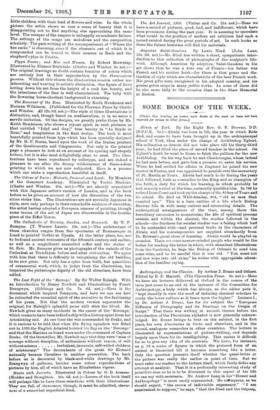SOME BOOKS OF THE WEEK.
[Under this heading UV indict such Books of the wok as handl not been reserved for revitw in other forme.] Alcuin of York. By the Right Rev. G. F. Browne, D.D. (S.P.C.K. 5s.)—Alcuin was born in '735, the year in which Bede died, and seems to have been brought up in the archiepiscopal school of York, then under the charge of Archbishop Egbert. His ordination as deacon did not take place till his thirty-third year; he had filled the place of second teacher in the school. On Egbert's death he went to Rome to fetch the pallium for the new Archbishop. On his way back he met Charlemagne, whom indeed he had seen before, and gave him a promise to enter his service. When he had settled his affairs in England he joined his new master in France, and was appointed to preside over the monastery of St. Martin at Tours. Alcuin had much to do during the year that followed, both as counsellor to the King and as champion of the faith, a duty for which his learning, in which probably he had scarcely a rival at the time, eminently qualified him. In 796 he retired from Court and took up the charge of the Abbey of Tours and its school. He died on Whit-Sunday, 804, "old as men then counted ago." This is a bare outline of a life which Bishop Browne fills in with many curious and interesting details. The ecclesiastical arrangements of the time, among them the hereditary succession to monasteries, the life of spiritual persona outside and within the cloister, the studies followed in the schools—the fondness for secular studies was a failing which had to be contended with—and personal traits in the characters of Alcuin and his contemporaries are supplied abundantly from Dr. Browne's great store of learning. Alcuin could be playful op occasion. There are some narrow-minded people who would be the better for reading the letter in which, with abundant illustrations from the Canticles, he begs the Bishop of Orleans to send him some wine, and to be careful that it was old. "You must not put new wine into old skins," he writes with appropriate altera- tion of the familiar saying.






































 Previous page
Previous page